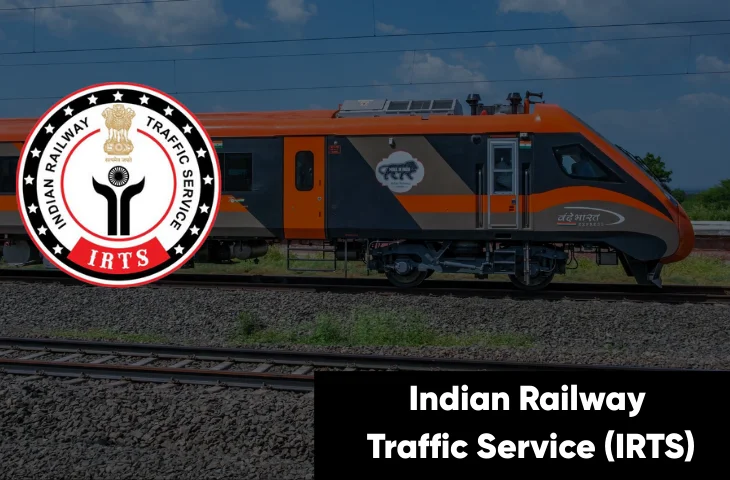The IRTS – Indian Railway Traffic Service is one of the most prestigious services under the Government of India, responsible for ensuring smooth operation, management, and growth of the railway transport system. It is often called the backbone of railway operations because it balances passenger convenience and freight efficiency.
Introduction to IRTS – Indian Railway Traffic Service
The IRTS is a Group ‘A’ Central Civil Service under the Ministry of Railways. Officers are recruited mainly through the UPSC Civil Services Examination.
Historical Background of IRTS
The origins of IRTS go back to British India, when the railway network needed a professional cadre to manage traffic and operations. Over the years, it has evolved into a specialized service responsible for strategic and operational management.
How are Candidates Recruited to IRTS?
Recruitment to the IRTS – Indian Railway Traffic Service is primarily done through the UPSC Civil Services Examination. Selected candidates undergo rigorous training before joining.
| Category | Details |
| Eligibility | Candidates must qualify in the UPSC Civil Services Examination (CSE) and secure a rank high enough to opt for IRTS. |
| Training | Foundation Course: Lal Bahadur Shastri National Academy of Administration (LBSNAA). Specialized Training: Indian Railways Institute of Transport Management (IRITM), Lucknow. |
| Structure of IRTS | The cadre is divided into two main branches for efficient railway management. |
| Commercial Branch | Focuses on passenger services, ticketing, freight marketing, revenue generation, and customer satisfaction. |
| Operations Branch | Responsible for train movement, scheduling, logistics, and safety, ensuring punctuality and optimal use of resources. |
Roles and Responsibilities of IRTS Officers
IRTS officers play a vital role in balancing passenger and freight traffic while ensuring smooth railway operations. Their key responsibilities include:
- Managing train operations and timetabling.
- Overseeing passenger amenities and services.
- Handling freight movement and marketing.
- Revenue generation and financial planning.
- Crisis management during accidents or disruptions.
Importance of IRTS in Indian Railways
The IRTS – Indian Railway Traffic Service acts as the lifeline for railway management. It is the link between the railways and the people, ensuring efficient service delivery.
Career Progression in IRTS
IRTS officers begin their careers as Assistant Operations/Commercial Managers and gradually rise to higher positions.
Levels of Promotion
- Assistant Operations/Commercial Manager
- Divisional Operations/Commercial Manager
- Senior Divisional Manager
- Executive Director at Railway Board
- Member (Traffic) at the Railway Board level
Challenges Faced by IRTS Officers
The job of IRTS officers comes with challenges, as they deal with operational complexities in one of the world’s largest rail networks.
Common Challenges
- Managing congestion in busy routes.
- Balancing freight and passenger demands.
- Coping with emergencies like accidents and natural calamities.
- Adopting digital technologies in operations.
Modernization and IRTS
With the digital revolution, IRTS officers are actively working towards modernizing railway operations.
Technological Advancements
- Use of Artificial Intelligence for scheduling.
- Digital ticketing and e-commerce integration.
- GPS-based train tracking.
- Smart freight management systems.
Contribution of IRTS to National Development
IRTS officers contribute not just to railways but also to the economy and society.
Economic Contribution
- Railways transport over 1.5 billion tonnes of freight annually.
- Cost-effective logistics boost trade and industry.
Social Contribution
- Affordable passenger transport for millions.
- Ensuring connectivity to remote regions.
Key Points at a Glance
We have summarized the important points of IRTS in a table below. Check out the information:
| Aspect | Details |
| Full Form | IRTS – Indian Railway Traffic Service |
| Recruitment | Congestion, emergencies, and modernization |
| Training Institutes | LBSNAA (Mussoorie), IRITM (Lucknow) |
| Branches | Commercial Branch, Operations Branch |
| Key Roles | Freight management, passenger services, timetabling, safety, revenue |
| Career Progression | Starts as Assistant Manager → Member (Traffic), Railway Board |
| Challenges | Economic growth, connectivity, and affordable travel |
| Modernization Initiatives | AI, GPS, e-ticketing, smart freight systems |
| Contribution | Economic growth, connectivity, affordable travel |
The IRTS – Indian Railway Traffic Service stands as a dedicated and dynamic cadre that ensures the Indian Railways remains the nation’s lifeline. Balancing passenger comfort with freight efficiency, IRTS officers are central to modernization and future growth. Their role is not just administrative but deeply connected with national development, making them one of the most vital services in the Indian Railways ecosystem.
FAQs
The IRTS (Indian Railway Traffic Service) is one of the most prestigious services under the Government of India, responsible for ensuring smooth operation, management, and growth of the railway transport system.
Candidates are recruited mainly through the UPSC Civil Services Examination.
Some of the major challenges faced by IRTS officers include:
Managing congestion in busy routes.
Balancing freight and passenger demands.
Coping with emergencies like accidents and natural calamities.
Adopting digital technologies in operations
Candidates must qualify in the UPSC Civil Services Examination (CSE) and secure a rank high enough to opt for IRTS.
An IRTS officer can be promoted to positions such as:
Assistant Operations/Commercial Manager
Divisional Operations/Commercial Manager
Senior Divisional Manager

Hello! This is Arijit Dutta. I am a skilled Content Writer at Oliveboard with nearly 3+ years of experience in crafting engaging, informative, and exam-focused content for the Railways Domain. With a strong command of language and a keen understanding of learner needs, I contribute significantly to Oliveboard’s mission of delivering high-quality educational resources. Passionate about clear communication and continuous learning, I consistently create content that helps government job aspirants achieve their goals. Outside of work, I enjoy playing cricket and listening to music, which helps me stay balanced and creative in my professional journey.
